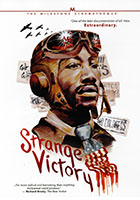
Strange Victory 2018, Orig. 1948
Distributed by Milestone Films & Video, PO Box 128, Harrington Park, NJ 07640-0128; 800-603-1104
Produced by Barney Rosset
Directed by Leo Hurwitz
DVD, b&w, 71 min.
Middle School - General Adult
Racism, Antisemitism, Post-war America
Date Entered: 12/11/2018
Reviewed by Christopher Lewis, American University Library, American UniversityIn 1948, as the recovery from World War II was well under way and the chill of the Cold War was beginning, Strange Victory was released. This ground-breaking documentary was an explosive indictment of the persisting prejudices within American society. Our soldiers had just won a war against an enemy whose ethos was rooted in racial hatred, only to return to a different brand of it back home. Strange Victory has a surprisingly complex narrative that contrasts the promises of a new day that winning the war engendered with the ominous fears that had previously underscored daily life.
To view this today, 70 years after its release, may make a film or history student wonder why it is not in the canon of landmark documentaries. It should have that stature but it was released precisely at the moment when any national ambitions to become a more just society began giving way to anti-communist sentiments among government leaders. As a result, Strange Victory was regarded as progressive and communistic, and played in just one theater in New York before disappearing.
The director, Leo Hurwitz, had honed his skills during the 1930s as a member of the Film and Photo League, the organization noted for its socially-conscious documentation of Depression-era events and conditions in the US. Strange Victory was the result of an idea sourced in research conducted at Antioch College on the persistence of discrimination following the war. Barney Rosset, later the publisher of Grove Press, and Hurwitz crafted the themes into a provocative narrative with a powerful effect visually and psychologically. What started as a work with support among Hurwitz’s colleagues at CBS ultimately led to his backlisting soon after the film’s release.
There are also several valuable bonuses on the DVD that complement the film. These include interviews with both Hurwitz and Rosset as well as an epilogue to Strange Victory, filmed in 1964 at the time of the Civil Rights movement. There are also six films from Hurwitz’s years with the Film and Photo League.
This is an essential title, recommended for all academic and public libraries.